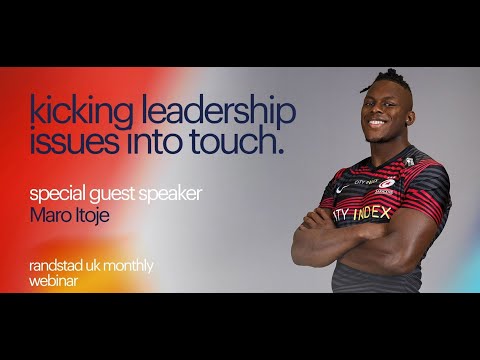Social justice movements across the globe in recent years reminded business leaders of the need for more diverse and inclusive workplaces. The momentum behind some of the most high profile movements inevitably spurred a broader discussion around whether companies were doing enough to ensure an inclusive work environment.
Randstad’s expert echo webinar series featured five-time Premiership winner, England World Cup 2024 player and British & Irish Lion legend, Maro Itoje, and throughout the discussion, it became clear that there is much businesses can learn, in terms of leadership and inclusivity from the game of rugby:
Statistics from the RFU suggest: “Despite growth of the women’s game and the most diverse England men’s team ever, compared to the overall England adult population, those who participate in Rugby Union are significantly less likely to be female, or of an ethnic minority and of the lowest socio-economic group. 57% of those involved in the game agree that rugby is representative of the local community it is in, but only 31% agree it is representative of the general population.”
Commenting on the findings, England and Saracens player, Maro Itoje said:
“In terms of the benefits of diversity, where do you start? Looking at it from a purely sporting point of view, if you have a wider pool of players you have more talent to select from; if you have more players to select from you have more competition, which in turn drives performance. If you have a wider, diverse group of people who have different thoughts, thinking patterns, experiences and backgrounds - in terms of problem solving, you have a greater chance of success. This is definitely something business leaders should be reminded about, and need to keep at the top of their agendas.”
Randstad's 2023 Workmonitor report, surveying over 2,000 UK employees revealed that 56% wouldn't accept a job if they didn't trust the organisation's leadership team.
Speaking on the importance of a diverse team, Maro added: “Diversity has a number of positive benefits for everyone involved. I think it’s relatively similar to those in businesses, from a cognitive point of view. If you have a wide and varied workforce, you can pull from different experiences, you can learn from each other.”
According to recent research from Gartner, a lot of companies believe that they’re already promoting a diverse and inclusive culture, however, only 40 percent of employees agree that their manager fosters an inclusive environment.
Speaking on whether this is the same for sport teams, and if both businesses and sports teams alike should have policies in place to help fight against discrimination and to promote a positive and diverse working environment, Maro said:
“What we desire to promote is not making people employ those who they don’t want to employ. What we want is employment purely based on merit, capability and equal opportunity.
"We don't want a situation where individuals from a certain demographic, social class or ethnicity are treated differently or spotlighted based on those elements. This shouldn't become a determining factor in deciding whether or not if the person is suitable for the job. It should purely be based on merit. Any way in which we can assure that is the case, we need to put that forward. Moreso in business than in sport, sport tends to be a bit more meritocratic than business.”
Speaking on what other sports can learn from Rugby Union in terms of diversity, attitude, respect and humility, Maro commented:
“In terms of diversity, rugby can take some learnings from other sports, to be honest. Football for example has a more diverse range of players than rugby. What other sports however can learn from rugby, is respect. That’s a big one. Considering how aggressive rugby is as a sport, the level of respect that players have for one another, the match officials and even the general level of respect that fans demonstrate is admirable.
I have friends who are predominantly football fans that are surprised when they come to watch a rugby match, and may be sitting next to other fans from different nationalities and backgrounds, watching the game amicably, with total respect from one another.
One of the great things about rugby is its culture. It’s predicated on respect, treating people fairly, being a good sportsperson, and that is one of the things about rugby that should be celebrated and encouraged.”






